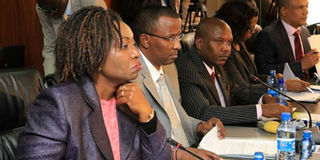IEBC proposes new way to respond to misconduct claims

Independent Electoral and Boundaries Commission (IEBC) officials appear before the Justice and Legal Affairs Committee on July 12, 2016. The commissioners have offered to respond in writing to misconduct claims against them. PHOTO | JEFF ANGOTE | NATION MEDIA GROUP
What you need to know:
- A ruling read by Mr Orengo said the committee had jurisdiction to hear the allegations, citing the constitutional provision that gives power to the people directly or through their representatives.
- But in a ruling read jointly by Mr Murungi and Mr Orengo, the committee overruled most of Mr Hassan’s objections.
Election chiefs on Monday chose to avoid questions on corruption allegations made against them when they appeared before a joint parliamentary select committee inquiring into their alleged misconduct and proposed electoral reforms.
However, after brief private consultations, the group, led by Independent Electoral and Boundaries Commission (IEBC) chairman Issack Hassan, agreed to submit a written memorandum on allegations facing individual members of the commission and secretariat.
Proceedings of the team co-chaired by Senators Kiraitu Murungi (Meru) and James Orengo (Siaya) were delayed for several hours after senators and Members of Parliament in the committee were forced into a five-hour retreat to prepare a ruling after the commissioners initially objected to their appearance.
A ruling read by Mr Orengo said the committee had jurisdiction to hear the allegations, citing the constitutional provision that gives power to the people directly or through their representatives.
Mr Orengo said the committee would also rule on whether those mentioned in corruption allegations would be required to make oral submissions to clarify issues, most of which touch on procurement of electoral materials.
“Parliament is within its right to form a select committee to hear the allegations facing the commission as per the motion approved by both the National Assembly and the Senate,” he said.
Earlier, Mr Hassan had raised a preliminary objection, accusing the committee of soliciting for allegations and turning itself into petitioners contrary to Article 251 of the Constitution, which provides that commissioners can only be removed through a petition filed in the National Assembly and a tribunal formed by the President.
“By collecting, collating and analysing allegations made elsewhere against the commission, the National Assembly and the Senate has turned itself into the petitioners,” he said.
“The only available mechanism to the public for removal of the commissioners from office is through a tribunal.”
But in a ruling read jointly by Mr Murungi and Mr Orengo, the committee overruled most of Mr Hassan’s objections, and also allowed him to address electoral reforms and systems proposals on how to make the 2017 elections free and fair.
In earlier proceedings, Mr Hassan had said given the select team’s mandate one and two, it was clear the committee was intent on ensuring removal of the commissioners and finding a suitable mechanism for their exit, saying that was unconstitutional since only the National Assembly had powers to do that.
He said no allegations had been made against the commissioners by previous presenters who had appeared before the committee, even from “those who had powers of investigating the same”.
Mr Hassan was accompanied by all eight commissioners, the agency’s CEO, Mr Ezra Chiloba, and several directors, some of whom have been named in the Special Audit report by the Auditor-General as having been involved in procurement irregularities.





